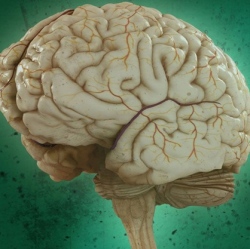
A study by neuroscientists at Toronto-based Baycrest Rotman Research Institute and Stanford University involving playing a musical instrument suggests ways to improve brain rehabilitation methods. The researchers asked young adults to listen to sounds from an unfamiliar musical instrument (a Tibetan singing bowl).
Half of the subjects (the experimental group) were then asked to recreate the same sounds and rhythm by striking the bowl; the other half (the control group) were instead asked to recreate the sound by simply pressing a key on a computer keypad.
After listening to the sounds they created, subjects in the experimental group showed increased auditory-evoked P2 (P200) brain waves. This was significant because the P2 increase “occurred immediately, while in previous learning-by-listening studies, P2 increases occurred on a later day,” the researchers explained in the paper. The experimental group also had increased responsiveness of brain beta-wave oscillations and enhanced connectivity between auditory and sensorimotor cortices (areas) in the brain.
The brain changes were measured using magnetoencephalographic (MEG) recording, which is similar to EEG, but uses highly sensitive magnetic sensors.
“The results … provide a neurophysiological basis for the application of music making in motor rehabilitation [increasing the ability to move arms and legs] training,” the authors state in the paper. The findings support Ross’ research in using musical training to help stroke survivors rehabilitate motor movement in their upper bodies. Baycrest scientists also have a history of breakthroughs in understanding how a person’s musical background impacts their listening abilities and cognitive function as they age.
“This study was the first time we saw direct changes in the brain after one session, demonstrating that the action of creating music leads to a strong change in brain activity,” said Bernhard Ross, PhD., senior scientist at Rotman Research Institute and senior author on the study.
“Music has been known to have beneficial effects on the brain, but there has been limited understanding into what about music makes a difference,” he added. “This is the first study demonstrating that learning the fine movement needed to reproduce a sound on an instrument changes the brain’s perception of sound in a way that is not seen when listening to music.”
The study’s next steps involve analyzing recovery by stroke patients with musical training compared to physiotherapy, and the impact of musical training on the brains of older adults. With additional funding, the study could explore developing musical training rehabilitation programs for other conditions that impact motor function, such as traumatic brain injury, and lead to hearing aids of the future, the researchers say.
